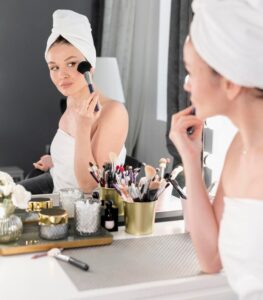
Psychological Stress and Its Effects on Beauty
Did you know that psychological stress can have a profound impact on your beauty? It’s not just a feeling of overwhelm or anxiety that you experience, but it can actually affect your physical appearance as well. Studies have shown that stress has detrimental effects on various aspects of beauty, from the health of your skin to your overall attractiveness.
In today’s fast-paced world, where stress has become a common part of our daily lives, it is essential to recognize the connection between emotional well-being and beauty. Understanding how stress can manifest in changes to our appearance can help us take the necessary steps to maintain our physical and mental health.
Key Takeaways:
- Psychological stress can have negative effects on your physical appearance.
- Stress can impact the health of your skin, hair, and body weight.
- Emotional well-being is closely linked to beauty and attractiveness.
- Managing stress is important for both mental and physical well-being.
- Practical tips for reducing stress can help enhance your overall appearance.
The Connection Between Stress and Appearance
When it comes to our physical appearance, stress can have profound effects. Research has shown that psychological stress can manifest in various ways, impacting our skin, hair, and even body weight. Understanding how stress affects our physical appearance can provide valuable insights into maintaining a healthy and vibrant look.
One of the most visible effects of stress on appearance is its impact on the skin. Stress has been linked to skin issues such as acne, dryness, and accelerated aging. The production of stress hormones like cortisol can disrupt the balance of oil on the skin, leading to breakouts and inflammation. Additionally, stress can impair the skin’s ability to repair itself and maintain its youthful elasticity, resulting in a tired and aged appearance.
Another area where stress can leave its mark is our hair. Chronic stress can contribute to hair loss, thinning, and even premature graying. Stress disrupts the natural hair growth cycle, leading to increased shedding and decreased follicle function. This can result in noticeable changes in hair thickness, texture, and overall health.
Furthermore, stress can also affect our body weight. For some individuals, stress may lead to weight gain as a result of emotional eating or disrupted sleep patterns. On the other hand, others may experience weight loss due to decreased appetite and increased metabolism associated with chronic stress. These fluctuations in body weight can impact our overall appearance and self-esteem.
There are scientific mechanisms that explain these effects of stress on appearance. Cortisol, often referred to as the stress hormone, plays a significant role in regulating our body’s response to stress. However, prolonged exposure to high levels of cortisol can have detrimental effects on various physiological processes, including those related to beauty. Elevated cortisol levels can disrupt the production of collagen and elastin, which are essential for maintaining skin elasticity and preventing signs of aging. Cortisol can also trigger inflammation, further contributing to skin issues.
Understanding the connection between stress and appearance is crucial for managing both our physical and emotional well-being. By acknowledging and addressing stressors in our lives, we can take steps to mitigate their impact on our appearance. Incorporating stress-management techniques such as exercise, meditation, and self-care can help promote a healthier, more radiant look.
Mental Health and Beauty
When it comes to beauty, it’s not just about applying skincare products or following the latest makeup trends. The connection between mental health and beauty is undeniable, and it plays a significant role in our overall well-being and appearance.
Emotional well-being and psychological stress can have a profound impact on our physical attractiveness. So, does stress affect appearance? The answer is yes. Stress can manifest itself in various ways, from affecting our skin to the overall radiance of our complexion.
When we experience stress, our bodies produce more cortisol, also known as the stress hormone. Increased cortisol levels can lead to inflammation, which can result in skin conditions such as acne, eczema, and even premature aging. The effects of stress on appearance go beyond just the skin; it can also impact our hair health and body weight.
But it’s not just the physical manifestations of stress that affect our appearance. Our mental well-being is closely tied to our self-esteem and confidence, which, in turn, influence how we perceive and present ourselves to the world. When we’re feeling anxious, overwhelmed, or emotionally drained, it can be challenging to radiate the beauty that comes from within.
Investing in our mental health is crucial for maintaining a healthy and radiant appearance. Prioritizing self-care, practicing stress-management techniques, and seeking support when needed are essential steps towards achieving emotional well-being and preserving our beauty.
The Beauty-Empowering Effects of Emotional Well-Being
When we nurture our mental health, we unlock the potential for inner beauty to shine through. A positive mindset and a sense of emotional well-being can enhance our self-confidence and self-esteem, giving us the ability to embrace our unique features and radiate beauty from within.
By managing stress levels and cultivating emotional resilience, we pave the way for a healthier and more vibrant appearance. Taking care of our mental well-being is just as important as maintaining a skincare routine or using beauty products. It’s about finding the balance between inner harmony and external care.
Ultimately, the relationship between mental health and beauty is undeniable. Our emotional well-being plays a significant role in our overall appearance and how we feel about ourselves. So, let’s prioritize self-care, practice mindfulness, and embrace the power of inner beauty for a truly radiant and authentic glow.
Tips for Enhancing Mental Well-Being and Beauty
- Practice stress-management techniques such as mindfulness meditation, deep breathing exercises, and yoga.
- Engage in activities that bring joy and relaxation, such as hobbies, spending time in nature, or socializing with loved ones.
- Prioritize self-care rituals, including taking regular breaks, getting enough sleep, and nourishing your body with healthy food.
- Seek professional help if you’re struggling with chronic stress, anxiety, or other mental health concerns.
- Surround yourself with positive influences and cultivate a supportive network of friends and loved ones.
Conclusion:
Psychological Stress and Its Effects on Beauty
Psychological stress can have significant effects on both mental well-being and physical beauty. Throughout this article, we have explored the connection between stress and appearance, highlighting the ways in which stress can impact various aspects of beauty, including skin health, hair, and overall attractiveness.
It is crucial to recognize the importance of managing psychological stress for maintaining a healthy and radiant appearance. Stress not only affects our emotional well-being but also manifests physically, leading to skin issues, premature aging, and changes in body weight. By reducing stress levels, individuals can improve their overall appearance and enhance their sense of self-confidence.
Looking after your mental health and finding ways to cope with stress is vital in maintaining a healthy balance between inner well-being and beauty. Prioritizing self-care, practicing relaxation techniques, such as mindfulness or meditation, staying physically active, and engaging in activities that bring joy and fulfillment can help reduce psychological stress and ultimately enhance one’s overall appearance and quality of life.
FAQ
Q: Can stress affect my physical appearance?
A: Yes, psychological stress can have various effects on your physical appearance. It can impact your skin health, hair quality, and even contribute to changes in your body weight. Stress can also affect your overall attractiveness and radiance.
Q: How does stress impact my skin?
A: Stress can disrupt the balance of hormones in your body, including cortisol, which is known as the stress hormone. Increased levels of cortisol can lead to skin issues such as acne, dryness, and even accelerated aging. Stress can also impair the skin’s ability to heal and regenerate.
Q: Does stress affect my hair?
A: Yes, stress can affect your hair in multiple ways. It can contribute to hair loss, thinning, and even changes in hair texture. Stress-induced hair loss, known as telogen effluvium, occurs when a significant number of hair follicles enter the resting phase prematurely.
Q: Can stress cause changes in body weight?
A: Yes, stress can influence your body weight. During periods of stress, some people may experience changes in appetite, leading to overeating or undereating. Stress can also impact the way your body metabolizes and stores fat, potentially contributing to weight gain or difficulty losing weight.
Q: Is there a connection between mental health and beauty?
A: Yes, mental health and beauty are interconnected. Your emotional wellbeing and psychological stress levels can impact your physical appearance. Low self-esteem, lack of confidence, and negative emotions can affect how you perceive and present yourself, ultimately impacting your perceived attractiveness.
Q: How can I manage stress to enhance my appearance?
A: Managing stress is essential for maintaining both mental and physical wellbeing. Some strategies to reduce stress and enhance your appearance include practicing stress-reducing techniques like meditation or yoga, engaging in regular physical activity, getting quality sleep, and seeking support from friends, family, or professionals if needed.
Related read: Understanding Stress’s Impact on Aging Process






